Related Research Articles
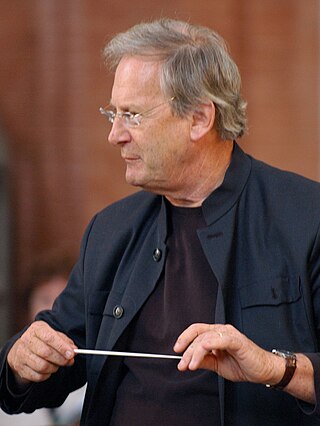
Sir John Eliot Gardiner is an English conductor, particularly known for his performances of the works of Johann Sebastian Bach, especially the Bach Cantata Pilgrimage of 2000, performing Bach's church cantatas in liturgical order in churches all over Europe, and New York City, with the Monteverdi Choir, and recording them at the locations.

Sir David Valentine Willcocks, was a British choral conductor, organist, composer and music administrator. He was particularly well known for his association with the Choir of King's College, Cambridge, which he directed from 1957 to 1974, making frequent broadcasts and recordings. Several of the descants and carol arrangements he wrote for the annual service of Nine Lessons and Carols were published in the series of books Carols for Choirs which he edited along with Reginald Jacques and John Rutter. He was also director of the Royal College of Music in London.
Hilliard Ensemble was a British male vocal quartet originally devoted to the performance of early music. The group was named after the Elizabethan miniaturist painter Nicholas Hilliard. Founded in 1974, the group disbanded in 2014.

The cantatas composed by Johann Sebastian Bach, known as Bach cantatas, are a body of work consisting of over 200 surviving independent works, and at least several dozen that are considered lost. As far as known, Bach's earliest cantatas date from 1707, the year he moved to Mühlhausen, although he may have begun composing them at his previous post in Arnstadt. Most of Bach's church cantatas date from his first years as Thomaskantor and director of church music in Leipzig, a position which he took up in 1723.
The St Mark Passion, BWV 247, is a lost Passion setting by Johann Sebastian Bach, first performed in Leipzig on Good Friday, 23 March 1731. Though Bach's music is lost, the libretto by Picander is still extant, and from this, the work can to some degree be reconstructed.

The Easter Oratorio, BWV 249, is an oratorio by Johann Sebastian Bach, beginning with Kommt, eilet und laufet. Bach composed it in Leipzig and first performed it on 1 April 1725.
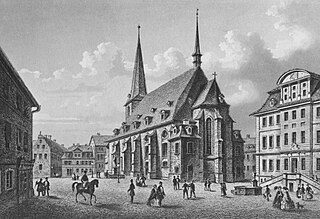
Der Himmel lacht! Die Erde jubilieret, BWV 31, is a church cantata by Johann Sebastian Bach for the first day of Easter. Bach composed the cantata in Weimar and first performed it on 21 April 1715.

Es erhub sich ein Streit, BWV 19, is a church cantata by Johann Sebastian Bach. He composed it in Leipzig in 1726 for the Feast of Saint Michael and first performed it on 29 September 1726. It is the second of his three extant cantatas for this feast.
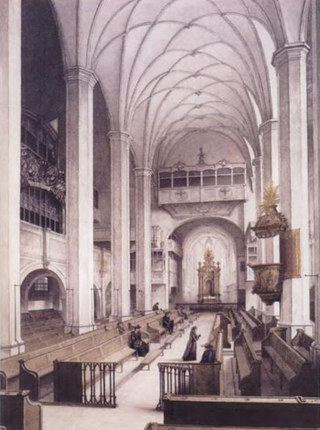
Gottlob! nun geht das Jahr zu Ende, BWV 28, is a church cantata by Johann Sebastian Bach for the Sunday after Christmas. He first performed it on 30 December 1725.

The Bach Choir of Bethlehem is the oldest Bach choir in the United States. Dating back to 1712, according to the choir's archives, it was formally founded in 1898 by Central Moravian Church organist John Frederick Wolle, and was established at roughly the same time as Bethlehem Steel, which first began operations in 1899.
Pforzheim Chamber Orchestra is an internationally known German chamber orchestra based in Pforzheim.

Selig ist der Mann, BWV 57, is a church cantata by Johann Sebastian Bach. He wrote the Christmas cantata in Leipzig in 1725 for the Second Day of Christmas, which was celebrated that year as St. Stephen's Day, and first performed it on 26 December 1725.

Fritz Lehmann was a noted German conductor, whose career was cut short by his early death at the age of 51. His repertoire ranged from the Baroque through to contemporary works, in both the concert hall and the opera house. He was an early advocate of period performance practice. and founded the Berliner Motettenchor. He is best known through a number of recordings he left.
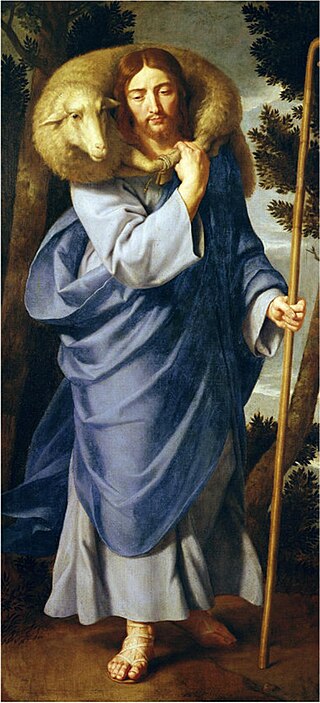
Du Hirte Israel, höre, BWV 104, is a church cantata by Johann Sebastian Bach. He composed it for the second Sunday after Easter in Leipzig and first performed it on 23 April 1724.
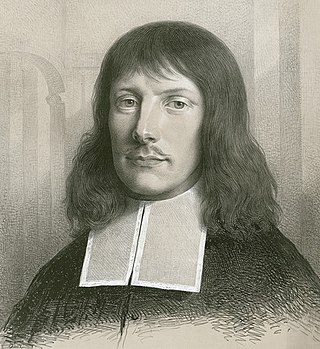
Johann Sebastian Bach composed the church cantata Lobe den Herren, den mächtigen König der Ehren, BWV 137, in Leipzig for the twelfth Sunday after Trinity and first performed it on 19 August 1725. The chorale cantata is based on the hymn by Joachim Neander (1680).
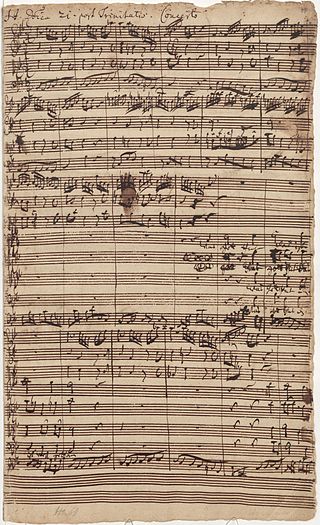
Johann Sebastian Bach composed the church cantata Was Gott tut, das ist wohlgetan, BWV 98, in Leipzig for the 21st Sunday after Trinity and first performed it on 10 November 1726.

Ich bin ein guter Hirt, BWV 85, is a church cantata by Johann Sebastian Bach. He composed it in Leipzig for the second Sunday after Easter and first performed it on 15 April 1725.

Bisher habt ihr nichts gebeten in meinem Namen, BWV 87, is a church cantata by Johann Sebastian Bach. He composed it in Leipzig for Rogate, the fifth Sunday after Easter, and first performed it on 6 May 1725.

Johann Sebastian Bach composed the church cantata Es reißet euch ein schrecklich Ende, BWV 90, in Leipzig for the 25th Sunday after Trinity and first performed it on 14 November 1723.
Rolf Schweizer was a German composer, choirmaster and church music director, who was based primarily at Pforzheim. Schweizer was part of the movement Neues Geistliches Lied, and his compositions, several of which appear in the Protestant hymnal Evangelisches Gesangbuch (EG), were heavily influenced by contemporary secular music, especially jazz.
References
- ↑ "Motettenchor Pforzheim". Bach Cantatas. Retrieved 15 July 2015.
- ↑ "Motettenchor Pforzheim". AllMusic . Retrieved 15 July 2015.